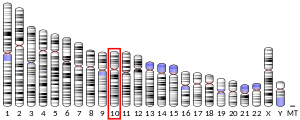GPR26
Probable G-protein coupled receptor 26 is a protein that in humans is encoded by the GPR26 gene.[4]
| GPR26 | |||||||||||||||||||||||||
|---|---|---|---|---|---|---|---|---|---|---|---|---|---|---|---|---|---|---|---|---|---|---|---|---|---|
| Identifiers | |||||||||||||||||||||||||
| Aliases | GPR26, G protein-coupled receptor 26 | ||||||||||||||||||||||||
| External IDs | OMIM: 604847 MGI: 2441758 HomoloGene: 17764 GeneCards: GPR26 | ||||||||||||||||||||||||
| |||||||||||||||||||||||||
| |||||||||||||||||||||||||
| |||||||||||||||||||||||||
| Orthologs | |||||||||||||||||||||||||
| Species | Human | Mouse | |||||||||||||||||||||||
| Entrez | |||||||||||||||||||||||||
| Ensembl |
| ||||||||||||||||||||||||
| UniProt | |||||||||||||||||||||||||
| RefSeq (mRNA) | |||||||||||||||||||||||||
| RefSeq (protein) | |||||||||||||||||||||||||
| Location (UCSC) | Chr 10: 123.67 – 123.7 Mb | n/a | |||||||||||||||||||||||
| PubMed search | [2] | [3] | |||||||||||||||||||||||
| Wikidata | |||||||||||||||||||||||||
| |||||||||||||||||||||||||
References
- GRCh38: Ensembl release 89: ENSG00000154478 - Ensembl, May 2017
- "Human PubMed Reference:". National Center for Biotechnology Information, U.S. National Library of Medicine.
- "Mouse PubMed Reference:". National Center for Biotechnology Information, U.S. National Library of Medicine.
- "Entrez Gene: GPR26 G protein-coupled receptor 26".
Further reading
- Adams MD, Soares MB, Kerlavage AR, et al. (1993). "Rapid cDNA sequencing (expressed sequence tags) from a directionally cloned human infant brain cDNA library". Nat. Genet. 4 (4): 373–80. doi:10.1038/ng0893-373. PMID 8401585.
- Lee DK, Lynch KR, Nguyen T, et al. (2000). "Cloning and characterization of additional members of the G protein-coupled receptor family". Biochim. Biophys. Acta. 1490 (3): 311–23. doi:10.1016/s0167-4781(99)00241-9. PMID 10684976.
- Salim K, Fenton T, Bacha J, et al. (2002). "Oligomerization of G-protein-coupled receptors shown by selective co-immunoprecipitation". J. Biol. Chem. 277 (18): 15482–5. doi:10.1074/jbc.M201539200. PMID 11854302.
- Strausberg RL, Feingold EA, Grouse LH, et al. (2003). "Generation and initial analysis of more than 15,000 full-length human and mouse cDNA sequences". Proc. Natl. Acad. Sci. U.S.A. 99 (26): 16899–903. doi:10.1073/pnas.242603899. PMC 139241. PMID 12477932.
- Gerhard DS, Wagner L, Feingold EA, et al. (2004). "The status, quality, and expansion of the NIH full-length cDNA project: the Mammalian Gene Collection (MGC)". Genome Res. 14 (10B): 2121–7. doi:10.1101/gr.2596504. PMC 528928. PMID 15489334.
This article is issued from Wikipedia. The text is licensed under Creative Commons - Attribution - Sharealike. Additional terms may apply for the media files.



